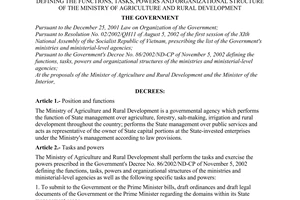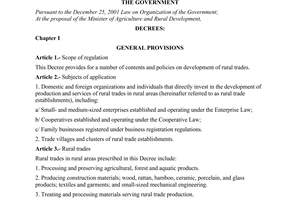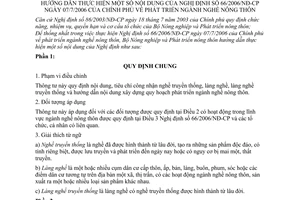Nội dung toàn văn Circular 116/2006/TT-BNN guidance implementation 66/2006/ND-CP development rural professions
|
MINISTRY OF
AGRICULTURE AND RURAL DEVELOPMENT |
THE SOCIALIST
REPUBLIC OF VIETNAM |
|
No: 116/2006/TT-BNN |
Hanoi, December 18, 2006 |
CIRCULAR
PROVIDING GUIDANCE ON IMPLEMENTATION OF SOME ARTICLES OF THE GOVERNMENT’S DECREE NO. 66/2006/ND-CP DATED JULY 7, 2006 ON DEVELOPMENT OF RURAL PROFESSIONS
Pursuant to the Government’s Decree No. 86/2003/ND-CP dated on July 18, 2003 defining the functions, tasks, powers and organizational structure of the Ministry of Agriculture and Rural Development;
In order to unify the implementation of the Government’s Decree No.66/2006/ND-CP dated July 7, 2006 on development of rural profession, Ministry of Agriculture and Rural Development provides guidance on implementations of some articles of this Decree as follows:
Part One
GENERAL PROVISIONS
1. Scope
This Circular prescribes contents and criteria for accreditation of traditional professions, trade villages and traditional trade villages and provide guidance on formulation of master plans for rural profession development.
2. Regulated entities
This Circular applies to regulated entities prescribed in Article 2 of Decree No.66/2006/ND-CP that join rural professions prescribed in Article 3 of this Decree and other relevant organizations and individuals.
3. Definitions
a) A traditional profession means a profession which has existed for a long time and manufactured unique and distinct products, been handed down and developed until now or can be buried in oblivion or lost.
b) A trade village means one or more residential areas of villages or other similar residential points in a commune or town that have rural professions producing one or more different types of product.
c) A traditional profession means a trade village having its traditional profession existed for a long time.
Part Two
ACCREDITATION OF TRADITIONAL PROFESSIONS, TRADE VILLAGES AND TRADITIONAL TRADE VILLAGES
I. THE CRITERIA FOR ACCREDITATION OF TRADITIONAL PROFESSIONS, TRADE VILLAGES AND TRADITIONAL TRADE VILLAGES
1. The criteria for accreditation of a traditional profession:
In order to be accredited, a traditional profession shall satisfy 03 criteria below:
a) The profession has been existed for more than 50 years by the date of application for accreditation;
b) The profession manufactures products that contain the national and cultural identity;
c) The profession is associated with the reputation of one or more artisans or trade villages.
2. The criteria for accreditation of a trade village:
In order to be accredited, a trade village shall satisfy 03 criteria below:
a) At least 30 percent of households in this village join rural professions;
b) The business activities in this village have been stable for more than 2 years by the date of application for accreditation;
c) The village well executes the State’s policies and law.
3. The criteria for accreditation of a traditional trade village:
A traditional trade village shall satisfy the criteria of a trade village and have at least one traditional profession defined in this Circular.
The trade villages that do not satisfy criteria a and b in Clause 2 (I) Part Two but have at least one traditional profession which is accredited in accordance with this Circular are also accredited as traditional trade villages.
II. PROCEDURES FOR ACCREDITATION OF TRADITIONAL PROFESSIONS, TRADE VILLAGES AND TRADITIONAL TRADE VILLAGES
1. People's Committees of communes, wards and towns (hereafter referred to as People's Committees of communes) having any of the professions prescribed in (I) Part Two of this Circular shall apply for accreditation of professions, trade villages or traditional trade villages and send applications to People's Committees of districts, towns, provincial cities (hereafter referred to as People's Committees of districts).
2. Applications for accreditation of traditional professions, trade villages and traditional trade villages
a) An application for accreditation of a traditional profession consists of:
- Brief description of establishment and the development of the traditional profession which is certified by People's Committees of communes.
- Copies of the medal certificates that have been awarded in national and international competitions and exhibitions or certificate of awarded artworks that is given by provincial authority or over (if any).
Organizations and individuals that were not able to take part in competitions, exhibitions or do not have any awarded artwork shall have the description of national and cultural identity of this traditional profession.
- A copy of the artisan certificate granted by the competent authority (if any)
b) An application for accreditation of a trade village consists of:
- A list of households joining rural professions which is certified by People’s Committees of communes.
- The brief description of the result of business activities of organizations and individuals that have joined rural profession within the latest 02 year.
- The certification of compliance with the State’s policies and law which is certified by the People’s Committees of communes.
c) An application for accreditation of a traditional trade village 0}
- An application for accreditation of a traditional trade village shall consist of documents as prescribed in Points a and b Clause 2 (II) Part Two of this Circular.
- In the cases where the accreditation of a trade village has been granted, the application for accreditation shall comply with Point a Clause 2 (II) Part Two of this Circular. If the accreditation of a trade village has not been granted but the accreditation of a traditional profession of this village has been granted, the application shall comply with point b Clause 2 (II) Part Two of this Circular.
- With regard to trade villages that do not satisfy criteria a and b in Clause 2 (I) Part Two of this Circular, the application consists of:
+ The brief description of the establishment and development of traditional professions which is certified by People’s Committees of communes.
+ Notarized copies of the medal certificates that have been awarded in national and international competitions and exhibitions or certificates of awarded artworks which are given by provincial authority or over (if any).
Organizations and individuals that were not able to take part in competitions, exhibitions or do not have any awarded artwork shall have the description of national and cultural identity of this traditional profession.
+ A copy of the artisan certificate granted by the competent authority (if any)
+ The certification of compliance with the State’s policies and law which is certified by the People’s Committees of communes.
3. Procedures for accreditation of traditional professions, trade villages and traditional trade villages
a) People’s Committees of districts shall collect applications which are sent by People’s Committees of communes, makes a list of them (enclosed with applications) and submit them to People’s Committees of provinces and central-affiliated cities (hereafter referred to as People’s Committees of provinces), which consider granting the accreditation of traditional professions, trade villages and traditional trade villages within 15 days from the day on which the valid applications are received.
b) People’s Committees of provinces establish the Approval Board, choose applicants that meet the criteria prescribed in this Circular, make a decision and grant Certificate of accredited traditional professions, trade villages and traditional trade villages within 30 days from the day on which valid applications are received
4. Time for accreditation of traditional profession, trade village and traditional trade village
Accreditations of traditional professions, trade villages and traditional trade villages will be organized annually and the time for accreditations will be decided by People’s Committees of provinces.
5. The accreditation of traditional professions, trade villages and traditional trade villages
People’s Committees of provinces will accredit traditional professions, trade village and traditional villages according to the criteria prescribed in this Circular.
Previous Decisions on accreditation of traditional professions, trade village and traditional villages of People’s Committees of provinces that satisfy the criteria prescribed in this Circular are still valid and shall be updated with new contents in accordance with the criteria prescribed in this Circular.
6. Traditional professions, trade village and traditional villages accredited by People’s Committees of provinces are eligible for incentive policies serving the rural profession development as prescribed in Decree No. 66/2006/ND-CP and documents providing guidance on implementation of this Decree promulgated by relevant competent authorities.
7. Revocation of Certificate of traditional professions, trade villages and traditional trade villages
Traditional professions, trade villages and traditional trade villages that fail to satisfy prescribed criteria after 05 years from the day on which they are accredited shall have their Certificates revoked.
People's Committees of each commune shall submit a list of traditional professions, trade villages and traditional villages that do not satisfy criteria as prescribed to People’s Committee of the district. People’s Committee of each district shall submit the list to the People's Committee of the province, which will consider revoking their Certificates.
Part Three
FORMULATION OF MASTER PLANS FOR RURAL PROFESSION DEVELOPMENT
I. THE BASIS FOR FORMULATION OF MASTER PLANS FOR RURAL PROFESSION DEVELOPMENT
1. The master plan for rural profession development shall be formulated from time to time and in accordance with master plans for socio-economic development of each area and whole country. The formulation of master plans for rural profession development shall comply with the Government’s Decree No. 92/2006/ND-CP dated September 7, 2006 on establishment, approval and management of master plans for socio-economic development.
2. People’s Committees of provinces shall formulate and send their master plans for rural profession development to Ministry of Agriculture and Rural Development, which will consolidate them and submit a report to the Government.
II. MAIN CONTENTS OF MASTER PLANS FOR RURAL PROFESSION DEVELOPMENT
1. Analysis and assessment of the actual development of rural professions in regions, structures of main products, material regions, technology, labor, manufacturers, infrastructures and environment.
2. Analysis of and forecast about factors impacting on rural profession development including impacts on development of trade villages, especially markets and requirements of competitive capacity of their products and service.
3. Identification of roles of rural professions in local economy and objectives of rural profession development.
4. Presentation of facts of master plans for rural profession development, main products and conditions that ensure to achieve objectives of master plans such as: material sources, technology, labor, etc.
5. Development of the program for preservation and development of trade villages in term of: preservation and development of traditional villages; development of trade villages associated with tourism; development of new trade villages.
6. Identification of solutions for mechanism, policies and implementation proposals of master plans
7. Expression of master plans for rural profession development on the map of master plans.
III. FORMULATION OF MASTER PLANS FOR RURAL PROFESSION DEVELOPMENT
1. The Ministry of Agriculture and Rural Development formulates master plans for rural profession development nationwide.
2. People’s Committees of provinces formulate master plans for rural profession development during process of industrialization and modernization of agriculture and rural areas in their provinces. Formulation of catalogue of programs and investment projects related to rural profession development shall consider balancing sources capital to ensure the implementation of these programs and investment projects in 2 periods: from 2007 to 2010 and from 2010 to 2020.
Projects for preservation and development of trade villages that are given priority: Preservation and development of traditional trade villages; development trade villages associated with tourism and development of new trade villages associated with domestic and foreign markets.
IV FUNDING SOURCES
The sources of funding for formulation of master plans, statutory expenditures on formulation and commission of plan are specified in Articles 8 and 9 of the Government’s Decree No. 92/2006/ND-CP on establishment, approval and management of master plans for socio-economic development and documents providing guidance on the implementation of this Decree.
Part Four
IMPLEMENTATION
1. People’s Committees of provinces that have had master plans for rural profession development shall inspect and adjust their master plans in accordance with this Circular.
2. Department of Processing and Trading Agricultural Forestry Aquatic Products and Salt, Department of Agriculture and Rural Development of provinces is responsible for cooperating with relevant authorities in regular or unscheduled inspection of implementation of master plans for rural profession development, accreditation of traditional professions, trade villages or traditional trade villages and implementation of policies related to rural profession development.
3. Regulations on reports
a) People’s Committees of provinces shall send a list of traditional professions, trade villages and traditional trade villages that are accredited to Ministry of Agriculture and Rural Development in December every year.
b) Department of Agriculture and Rural Development of provinces are responsible for submitting reports on rural profession development in their provinces, difficulties and suggestion related to policies of rural profession development to Ministry of Agriculture and Rural Development in December 15 every year.
4. This Circular takes effect after 15 days from the day on which is published on the Portal. During process of implementation, areas and units inform timely about queries and difficulties of this Circular to Ministry of Agriculture and Rural Development./.
|
|
P.P. MINISTER |
------------------------------------------------------------------------------------------------------
This translation is made by LawSoft and
for reference purposes only. Its copyright is owned by LawSoft
and protected under Clause 2, Article 14 of the Law on Intellectual Property.Your comments are always welcomed


